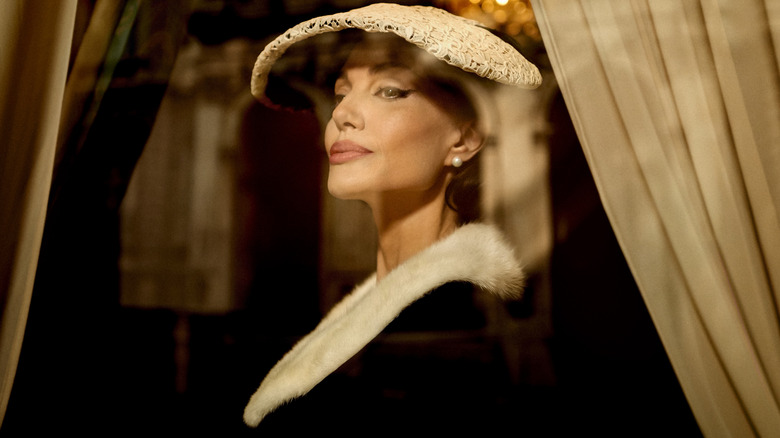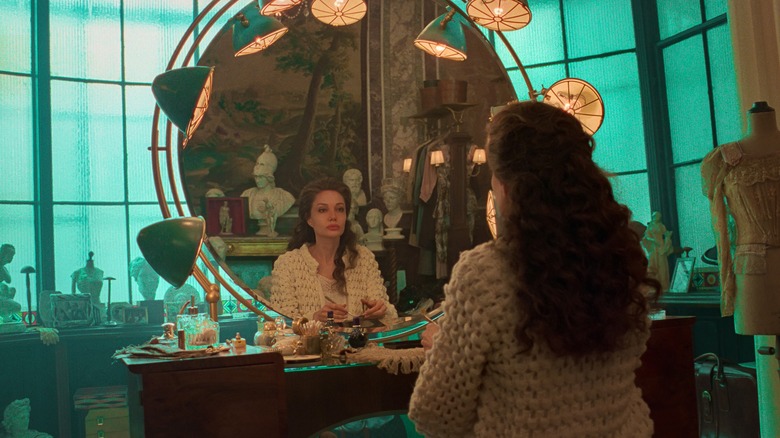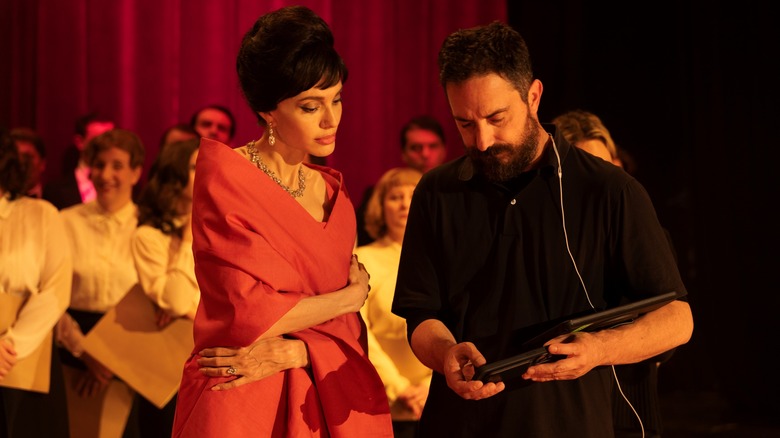Maria Review: Angelina Jolie Delivers A Transcendent Performance [NYFF]
A strange thing happens when lifelong artists begin to sense the light at the end of the tunnel. Some, like Francis Ford Coppola with "Megalopolis," have the freedom to go out on their own terms, guns blazing and critics be damned, with one of the most bombastic and extravagant works they've ever produced. Others, however, aren't nearly as fortunate. Time and trauma take their tolls, forcing even the greatest legends to contend with a much more complicated reality: the fact that their dreams no longer match reality. By the end, nostalgia crashes hard against resentment and triggers a deep-rooted pain directed towards the very talents that made life worth living in the first place.
Spanish filmmaker Pablo Larraín isn't even close to the finish line, of course, yet in many ways "Maria" feels like his most wistful and self-reflexive movie yet. After guiding both "Jackie" and "Spencer" to such high acclaim in recent years, his latest brings a stirring close to his fascination with famous women at particularly harrowing moments in their public (and private) lives. Even more tragic than either of his previous subjects, however, the story this time around centers on world-renowned opera singer Maria Callas during the last week of her life in 1977 Paris. The history books, tabloid hit pieces, and news reports of the time remember her final years as that of a shut-in, a cautionary tale of what happens when scandal and self-destructive vices rob the world of a one-of-a-kind celebrity far too soon. What Larraín and the perfectly-cast Angelina Jolie reimagine instead is an utterly human rendering of a larger-than-life figure, which required a transcendent performance by another truly larger-than-life movie star to do her any justice whatsoever.
It'd be far too reductive to draw any direct 1:1 parallels between Maria and Larraín (or even Jolie), as tempting as it might be, but it's apparent that this movie could've only been made by these specific artists at this very specific moment of their careers. "Maria" stands out as a fitting swan song (of sorts) by putting a bow on this spiritual "trilogy" of biopics – one that's every inch as soulful, heartbreaking, and beautifully contradictory as the woman herself.
Maria is Pablo Larraín at his most haunted and fatalistic ... and his funniest
"The world took liberties with me," Maria Callas morosely observes early on, even as she's surrounded by the decadence that same world once so freely lavished upon her. "Maria" doesn't shy away from even the most mundane contradictions and ironies behind the ill-fated opera singer, though that never once undermines the genuine burdens she bears. In fact, the empathetic script (from "Jackie" screenwriter Steven Knight) begins with its most fatalistic scene of all before flashing back to a week earlier, charting Maria's final days as she attempts one last comeback to reclaim her voice (in every sense of that phrase) and prove she's not the washed up "prima donna" everyone sees her as. Whether she's doing this for her vanity, her legacy, or something else entirely is pointedly left unsaid ... though not unexplored.
Much like the haunted tone prevalent in both "Jackie" and "Spencer," "Maria" takes the form of a ghost story in the early going. It's not just that the editing (handled by Sofía Subercaseaux) adds to the film's early unease by constantly peppering in black-and-white footage of Jolie's Maria in her prime alongside stylized film reels of her private life, abruptly cutting away from the present to lavish in her past triumphs on the opera stage. Cinematographer Edward Lachman's camera roves through empty hallways and gorgeously set-dressed rooms like a silent, unseen observer soaking in Maria's fallen state. This carefully established visual language is only broken on the few occasions Maria ventures outside her Parisian mansion, when she conducts television interviews with a scrawny reporter (Kodi Smit-McPhee, who more than holds his own) that delve right into the turbulent psychology of the legendary singer. Then again, these are the same series of conversations that Maria herself, suffering from an addiction to Mandrax pills, readily admits might not be exactly what they seem.
Impressively, the film's blurring between fact, fiction, and fantasy with these "visions" makes room for surprising amounts of humor. Larraín has rarely been funnier or more sarcastic than he is here, packing in visual punchlines, snappy running gags, and witty barbs of dialogue — most of which are delivered by Maria's only two companions, her long suffering butler Ferruccio (Pierfrancesco Favino) and her household maid Bruna (Alba Rohrwacher). Together, they ground Maria's epic emotional journey in something real, quietly giving Maria permission to wrestle with her identity as Maria, not the suffocating La Divina (The Divine One) moniker that the public crowned her as.
Angelina Jolie gives a performance for the ages
Practically every immaculate shot in "Maria" is framed as if it were the title character's own theater stage. This makes an apt runway for Angelina Jolie to do her thing and deliver easily her most dialed-in performance of the last decade (or more). Jolie's bravura singing abilities have undoubtedly stolen all the headlines throughout this festival run, but don't sleep on Larraín's direction, Knight's script, and Larraín's photography working in perfect tandem with Jolie's more overall physical performance. The camera repeatedly holds on Jolie's deceptively fragile-looking face to hint at the well of emotions that she often refuses to let others see. Self-assured and blisteringly confident on the outside as only a successful singer could be, it's in the brief moments that Maria drops her guard that the endless depths of her interiority come flooding in. Awards prognosticating will always be the most boring way to approach movies like these, but rest assured that Jolie will receive her flowers regardless of whether the Academy takes notice or not.
The same can be said for the overall movie. Whenever "Maria" covers ground trodden by countless biopics before, like her troubled childhood or her ominous health issues or her supremely complicated love life with both husband Giovanni Battista Meneghini (Alessandro Bressanello) and eventual lover Aristotle Onassis (Haluk Bilginer), at least Larraín does so with a light touch and an eye for unexpected detail. In the process, the filmmaker strikes at the heart of what the story of Maria Callas was always about. By skipping past the more conventionally dramatic years of her life, "Maria" frees itself to explore potent themes of power and control and agency. Along the way, those more familiar with Maria's backstory — hint: take another look at her lover Aristotle's very famous surname — will appreciate how the director all but reaches through the screen and overtly comment on the long shadow cast by "Jackie." This has the added benefit of injecting a wry sense of self-deprecation to the proceedings ... along with the feeling that he's genuinely ready to escape this biopic-shaped box he's built for himself (which was plain to see for those who bothered to watch his last film, "El Conde").
By the time we reach the final curtain call, the ending isn't so much predictable as it is tragically inevitable. "Maria" might not quite reach the same heights as its two biopic predecessors, but consider that that was never the intention in the first place. If there's anything that truly holds this back, it's the Netflix distribution deal that condemns this to an ill-deserved streaming fate. Forget about being a theater snob or purist — when Jolie's Maria is belting out sonnets and basking in the deafening applause of her adorers, the effect can't help but be dampened when seen on one's laptop or in one's living room rather than with a packed crowd.
Still, that's hardly the film's fault. "Maria" closes out this trilogy exactly as it started and, for one last time, we're given a window into one of the most unknowable individuals of decades past. Film gods willing, Larraín's next phase will feel just as vital and thrilling as this one.
/Film Rating: 8 out of 10
"Maria" will release in select theaters November 27, 2024, followed by its streaming premiere on Netflix December 11, 2024.


